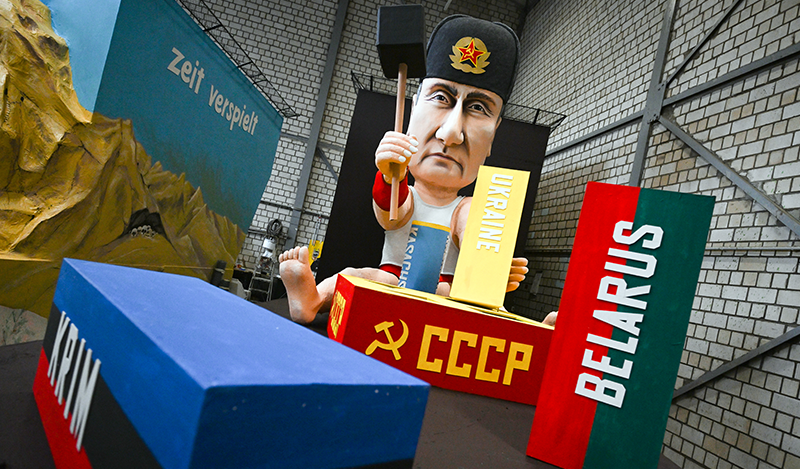One of the biggest questions of the Ukraine war concerns tensions half a world away: What lessons will China draw from the Russian invasion?
Western observers hope that Russian President Vladimir Putin’s faltering invasion of Ukraine will convince China to go slow — that it will discourage President Xi Jinping from undertaking an invasion of Taiwan. Yet there’s a real possibility that it could actually induce Beijing to go fast — to use force more harshly and decisively in hopes of avoiding the type of quagmire into which Moscow has stumbled.
Learning from other people’s wars is a time-honored tradition. In the early 20th century, Western observers scrutinized the Russo-Japanese war for hints about the dynamics of modern conflict. During the Cold War, lessons drawn from the Arab-Israeli wars strongly influenced Moscow’s and Washington’s preparations for a superpower showdown that, mercifully, never occurred.
Today, Chinese observers are surely scrutinizing events on the battlefield as well as the global response to Putin’s assault. There are two conflicting narratives about what they are learning.
The first, touted by high-ranking Pentagon officials and some other analysts, is that Ukraine offers a cautionary tale for Beijing. In this telling, Chinese officials now see how hard it is to conquer a country that is fighting for national survival. The People’s Liberation Army, which has not waged a significant conflict in more than 40 years, has likely been sobered by how poorly another autocratic military has executed the complex tasks associated with contemporary warfare.
Xi must also be stunned by the performance of U.S. intelligence, which deprived Putin of anything resembling strategic surprise and has thus given fair warning that China, too, might have any aggressive plans laid bare. The economic costs that the democratic world has imposed on Moscow, the unity it has summoned in response to an unprovoked attack, and the fact that the conflict is creating a larger, more invigorated North Atlantic Treaty Organization cannot escape Xi’s attention, either.
From this vantage point, a bloody war in Europe could help preserve the peace in Asia. It could force Xi’s government to revisit a whole range of assumptions about how well the PLA would perform under wartime stress and what consequences a war might bring down on Beijing.
This is certainly the lesson Western officials want Xi to draw — a desire that surely reflects some of the self-congratulation that has crept into the West’s assessment of its own performance. If the democracies have stunned themselves with their support for Ukraine, then surely Xi has been stunned as well.
Or perhaps China’s ruler is drawing a much different lesson.
Xi has presumably noticed that the U.S. and other democracies have given arms, training and money to Ukraine but refrained from joining the fighting. Beijing may not be impressed with the sanctions imposed on Moscow, given Europe’s reluctance to take more drastic steps, such as quickly halting purchases of Russian energy, that would inflict pain on its own citizens. The Chinese know, moreover, that their larger, more sophisticated economy would be far harder to strangle than Russia’s.
And maybe, in Xi’s view, Putin’s mistake was not his decision to invade Ukraine — it was that he conducted the invasion in such a bumbling, indecisive manner, giving the Ukrainians the chance to fight back and Washington and its allies the opportunity to make Moscow pay.
This interpretation might push Xi in a more dangerous direction. It could convince him that the key to winning a potential Taiwan conflict is to use overwhelming force — crippling missile barrages, coordinated cyberattacks, assassination and subversion campaigns, followed by a decisive, large-scale invasion — to break the country’s resistance before the U.S. and other nations can get in the way.
This conclusion would mesh well with a Chinese military tradition that has long emphasized surprise attacks, and with doctrinal writings that call for asserting control of a contest in its earliest moments. “Seize the battlefield initiative, paralyze the enemy’s war command, and give shock to the enemy’s will,” one of China’s authoritative military publications exhorts.
There is, unavoidably, some guesswork here. Even talented China watchers struggle to pierce the opacity of the regime and know what is in Xi’s mind. China’s lessons from Ukraine may evolve as the conflict does: Whether Russia ultimately succeeds or fails could be critical.
The two narratives sketched here aren’t even necessarily contradictory. Putin’s difficulties could give Xi pause about whether to invade Taiwan, while also pushing the PLA to be more forceful in how it conducts any prospective assault.
Yet if Xi is as committed to unification with Taiwan as his public rhetoric and the PLA’s feverish preparations suggest, then “go fast” is at least as plausible a takeaway as “go slow.” American observers need to be wary of mirror-imaging — of assuming that our rivals perceive reality as we do. In supporting Ukraine, the world’s democracies may think they are convincing Xi not to invade Taiwan. They may simply be encouraging him to do it faster and better.
Источник: https://www.aei.org/

